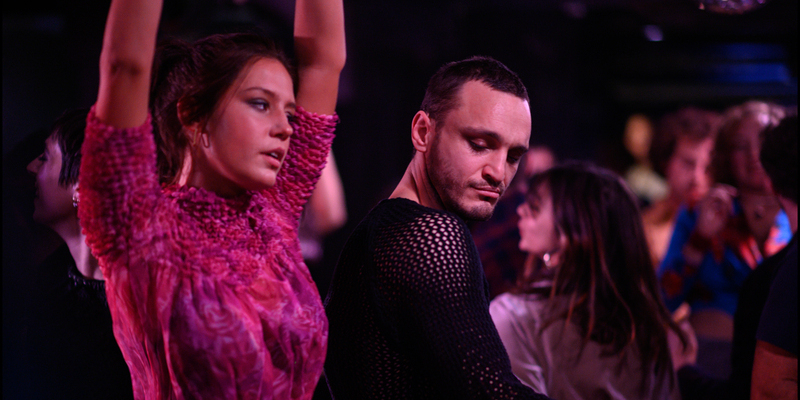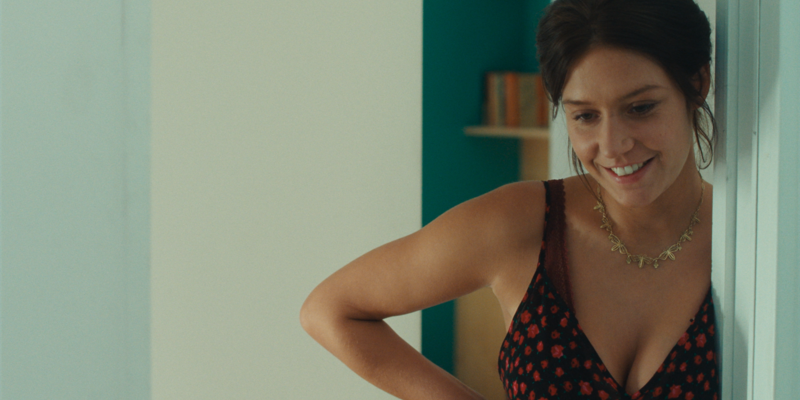
Review by
Eric Hillis
Directed by: Ira Sachs
Starring: Franz Rogowski, Adèle Exarchopoulos, Ben Whishaw

There's a rather crude stereotype that paints Germans as the sort of
people who when staying at a holiday resort, head to the pool before
breakfast and drape a towel over a sun lounger to ensure it's claimed
for their later use. To borrow this metaphor, writer/director
Ira Sachs' Passages is about a German who drapes
his towel over two sun loungers.
Said German is Tomas (Franz Rogowski), a Paris based filmmaker
with an English husband, Martin (Ben Whishaw). The film opens
with Tomas throwing a strop on the final day of shooting his latest
work, and it's clear he possesses impatience with other people, but
needs them regardless. At the wrap party, a wired Tomas meets young
teacher Agathe (Adèle Exarchopoulos). The two dance (in that
terrible way only Europeans can) and later end up in Agathe's bed.

Rather than keeping his betrayal a secret, Tomas proudly announces his
adventure to Martin the following morning. "I slept with a woman last
night," he declares with the enthusiasm of a novice daredevil who just
performed their first parachute jump. Tellingly, Martin doesn't seem all
that bothered, and it's clear that dealing with Tomas's ways have burnt
him out. Soon, Tomas is living with Agathe while Martin takes on a new
lover, but Tomas is back and forth between Agathe and Martin, dipping
his soggy nachos in two salsa bowls.
Sachs makes movies about very clear-headed white middle class people
who try their best to deal with situations in an adult fashion. It's
almost impossible to imagine someone like Tomas getting away with his
behaviour in any other cultural milieu; he'd likely end up at the bottom
of the Seine. But Tomas preys on Agathe and Martin's insecurities,
making them feel like a pair of rubes who aren't sophisticated enough to
understand he needs the stimulation of unconventional relationships.
He's the classic dickhead artist who casts those around him as their
muse, a weapon he wields to make them feel responsible for any potential
artistic downfall. Sachs never quite establishes whether Tomas is
actually talented or merely a hack. Does it matter?

With his soft spoken lisp and vulnerability, Rogowski has become one of
the most likeable actors working on the continent today, so it's a shock
to see him take so naturally to playing such a loathsome character.
Unfortunately for Germans it's probably going to take a few more generations for the rest of us to stop subconsciously associating them with Nazis, such has been the relentless
scratching of old war wounds by American and British media over the last
eight decades, and Rogowski's campness reminds us of many broad
portrayals of Nazis on screen. That Tomas behaves this way in
Paris of all places, a city where a German might be best advised to keep
their head down, adds an extra layer, not to mention how his victims are
British and French.
Sachs is often mistakenly thought of as a "talky" director. But while
his films are filled with dialogue they're also cleverly visual in their
storytelling. We learn very little about Tomas, Martin and Agathe
through dialogue here, because they're mostly lying, either to each
other or themselves. Instead we figure them out through behaviour: how
they pause before entering doors; how Agathe lies in a foetal position
listening to Tomas have sex with Martin in the next room; how Tomas
hunches his shoulders in a plea for sympathy. The costumes also play a
large role in establishing the central trio. Agathe always dresses to
impress; Tomas dresses to provoke (in one of the funniest scenes arrives
for his first meeting with Agathe's parents dressed in a crop top);
while Martin wears baggy jumpers that barely fit because they're
comfortable and with so much stress elsewhere in his life, he doesn't
want his clothes to betray him.

At one point Agathe realises she simply isn't cut out for the chaos of
living with Tomas and Martin. "I'm afraid I'll get lost between you
two," she confesses. If I have one gripe with the film it's that
ironically Agathe gets lost in the narrative as Sachs and his regular
co-writer Mauricio Zacharias focus on Tomas and Martin. While
Martin is a layered portrayal of a put-upon husband, Agathe is reduced
to little more than a one-note victim, a shame given how she's portrayed
by one of the most exciting actresses to rise in European cinema in
recent years.


